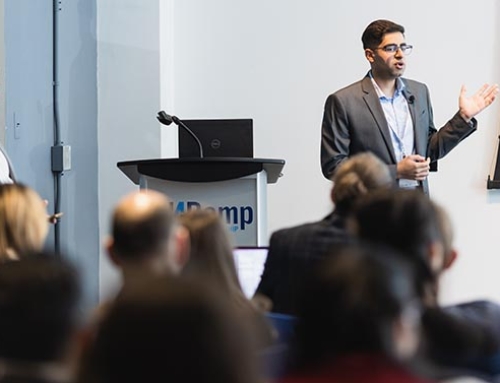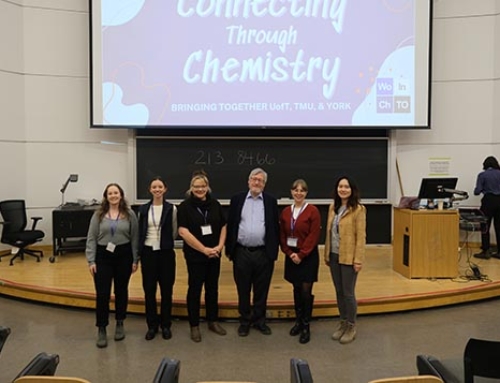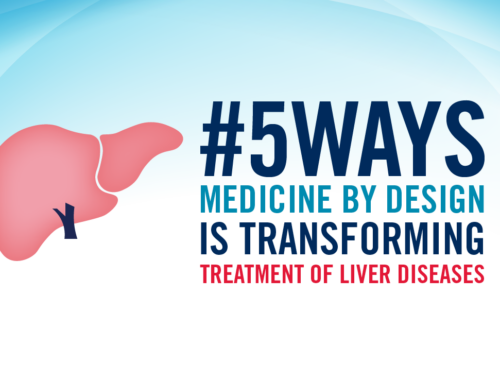
It was chance that brought the collaboration of Dr. Tom Waddell and Alison McGuigan together.
When Professor McGuigan started her lab at the Department of Chemical Engineering & Applied Chemistry and the Institute of Biomedical Engineering at the University of Toronto (U of T) she remembered Waddell as a rigorous external advisor she had been linked with when finishing her PhD. His challenging questions had made an impression on her. She decided to contact him to see if there was a way they could work together.
Waddell, a thoracic surgeon at the Ajmera Transplant Centre, University Health Network, and a professor of thoracic surgery at U of T, for his part, was interested in McGuigan’s research involving cilia — hair-like structures on the outside of cells that sense the environment around them.
They formed a collaboration to look at cilia in the lung that is not functioning properly, which contributes to health issues including a respiratory condition called primary ciliary dyskinesia, from two different perspectives. Waddell brings his clinical and surgical knowledge, and McGuigan brings her engineering expertise.
It’s a collaboration that has yielded interesting research from Waddell and McGuigan, who are both Medicine by Design-funded investigators.
In August, Waddell and McGuigan led a discussion on their experience as collaborators as part of Regen Med in the Clinic, a new partnership between the Ajmera Transplant Centre and Medicine by Design. This partnership will continue to provide training and networking opportunities through seminars, lunch and learns and speed collaboration events.
These events will provide a forum for clinical fellows at the Ajmera Transplant Centre and trainees in Medicine by Design-funded labs to exchange perspectives.
“We want to create linkages between the clinical side and emerging science and technologies, and also bring multiple disciplines together.” says Dr. Atul Humar, director of the Ajmera Transplant Centre and a professor of medicine at U of T, “The program is especially targeted to Ajmera’s clinical fellows. It’s very translational, because clinical fellows are going to be future leaders who are performing transplants but also doing the science. We want to expose them to regenerative medicine early in their training.”
As regenerative medicine therapies become more available to patients there is an increasing need for clinicians who understand and can deliver these new treatments. And engineers and scientists must also be knowledgeable about clinical concerns to ensure their technologies and strategies are meeting patients’ needs.
The Ajmera Transplant Centre is a multi-organ transplant centre that runs the largest and most comprehensive transplant program in Canada, performing about one-fifth of all organ transplants in the country. The centre is known around the world for expertise in kidney, liver, lung, heart and pancreas and intestinal transplant procedures. Several Medicine by Design-funded researchers on large team projects are affiliated with the Ajmera Transplant Centre.
“Medicine by Design wants to lead the way in making sure that appropriate regenerative medicine therapies become available to patients in the healthcare system, and also that clinicians are ready to give these transformative treatments to patients who need them,” says Michael Sefton, executive director of Medicine by Design and a University Professor at the Department of Chemical Engineering & Applied Chemistry and the Institute of Biomedical Engineering at U of T.
Sefton, whose lab is located at the Donnelly Centre for Cellular and Biomolecular Research, adds that regenerative medicine and transplant medicine have a natural synergy, “Many of regenerative medicine’s aims such as tissue and organ regeneration are aims that are shared in the transplant sphere. Combining our knowledge in these areas further integrates these fields, reinforcing existing clinical relationships and building new ones.”
In addition to learning and training opportunities, Medicine by Design and the Ajmera Transplant Centre will also work together to build new connections to the international regenerative medicine community. Medicine by Design’s support will allow expanded international participation in an annual trainee symposium organized each spring by the Ajmera Transplant Centre’s Training Program in Regenerative Medicine (TPRM).
“Expanding outreach to international trainees and clinical fellows will increase the awareness of Toronto as a destination of choice for trainees and early-career researchers and clinicians in regenerative medicine,” says Sefton. “We have a world-class research community in regenerative medicine here, and this partnership will help spark new international collaborations.”

Professor Alison McGuigan, Department of Chemical Engineering & Applied Chemistry and the Institute of Biomedical Engineering, University of Toronto, and Dr. Tom Waddell, a thoracic surgeon at the Ajmera Transplant Centre, University Health Network, gave a presentation at the first Regen Med in the Clinic session highlighting how their collaboration brings engineering and clinical medicine together.
Regenerative medicine uses stem cells to replace diseased tissues and organs, creating therapies in which cells are the biological product. Regenerative medicine can also mean triggering stem cells that are already present in the human body to repair damaged tissues or to modulate immune responses. Increasingly, regenerative medicine researchers are using a stem cell lens to identify critical interactions or defects that prepare the ground for disease, paving the way for new approaches to preventing disease before it starts.
Funded by a $114-million grant from the Canada First Research Excellence Fund, Medicine by Design brings together more than 150 principal investigators at the University of Toronto and its affiliated hospitals to advance regenerative medicine discoveries and accelerate them toward impact. It builds on decades of made-in-Canada excellence in regenerative medicine dating back to the discovery of stem cells in the early 1960s by Toronto researchers James Till and Dr. Ernest McCulloch.





